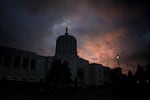The basics
Measure 107 is a straightforward proposal, with a complicated back story.
Related: OPB’s 2020 election coverage, ballot guide and results
If approved, the measure would amend Article II Section 8 of the state’s constitution to ensure that the state, counties, cities and other jurisdictions can set rules explicitly limiting campaign contributions and campaign spending. The measure would also formally allow rules requiring campaigns to be transparent about how political ads are funded, and about contributions and spending in general.
What it does
Oregon is currently one of just five states that places no limits on how much people can give to campaigns. There’s a long history that led the state to that place, but for the last 23 years, the central reason was a 1997 Oregon Supreme Court opinion that said campaign contributions amounted to free speech, and so could not be limited.
In the absence of campaign finance limits, campaigns in Oregon have grown increasingly expensive. One signature example: The 2018 race for Oregon governor, which shattered records and resulted in the candidates spending nearly $40 million combined.

If voters approve Measure 107, the state's constitution will be amended to explicitly allow campaign finance limits in state and local political races for the first time.
John Rosman / OPB
That race, along with other mounting scrutiny about Oregon’s permissive laws, persuaded lawmakers in 2019 to refer a measure to the ballot asking voters whether campaign finance regulations should be explicitly allowed in the Oregon constitution.
If the measure passes — which, given recent polling and a lack of organized opposition, seems very possible — Oregon lawmakers anticipate spending next year’s legislative session debating what campaign finance rules should look like in state races. That’s a process that will almost certainly prove acrimonious, as different factions try their best to preserve power.
But there’s a hitch: Even if the measure doesn’t pass, it’s almost certain Oregon will see some campaign finance regulations move forward. That’s because of an April opinion by the Oregon Supreme Court in which justices reversed themselves, ruling that campaign contribution limits are not inherently unconstitutional. Multnomah County and the City of Portland, which passed limits in 2016 and 2018 respectively, are already enforcing them.
The court’s ruling does not go as far as Measure 107, meaning campaign finance rules would likely be more narrow — and potentially more vulnerable to legal challenges — if the measure doesn’t pass.
Who’s for it?
The initiative is backed by a wide array of groups and officials, including Gov. Kate Brown and much of the Legislature (which, remember, referred the matter to the ballot in the first place). Also on board are good government groups like Common Cause and the League of Women Voters, and labor unions. The group Honest Elections Oregon, which played a major role in getting the Supreme Court to reverse its stance on campaign contributions, is backing the measure, too.
Much of the money for the political action committee running the campaign has come from committees affiliated with Brown, but national campaign finance reform groups and labor unions have also cut big checks.
While the proponents of the measure have varying ideas about what campaign finance regulations should look like, they agree on broad reasons for why they should exist.
Those include arguments that Oregon elections have become far too expensive but, more than that, concerns that wealthy interests are corrupting, or attempting to corrupt, the state’s political system.
The poster child for that argument is Nike co-founder Phil Knight, who poured more than $2.5 million into the 2018 gubernatorial campaign of Republican Knute Buehler, breaking the record for individual giving in the state. But proponents also point to big donations from pharmaceutical companies or industrial polluters, which they say are made for the sole purpose of killing proposed regulations.

Nike President and CEO Phil Knight addresses a shareholders meeting in Portland, Ore., Sept. 22, 1997.
John Gress
“Our campaign finance system favors the wealthy and well-connected,” said Sonny Mehta, a spokesman for the pro-107 campaign.
Some lawmakers agree. Included in voters' pamphlet statements favoring the measure was an entry from two state senators, Ashland Democrat Jeff Golden and Bend Republican Tim Knopp.
“Even for officials of the highest integrity, it can be nearly impossible to keep the mind from wandering to what the big donors are likely to think,” the statement says. “That distraction, right on the brink of critical decisions, doesn’t lead to sound government of, for, and by people.
Who’s against it?
If the Supreme Court had ruled differently on campaign finance contributions in April, it’s likely the race over Measure 107 would be far different. After all, well-heeled business groups had been urging the court not to limit contributions. Many expected them to mount a fierce campaign against Measure 107 as well.
But with the court ruling contributions limits aren’t inherently illegal, opposition has been scarce — so much so that the most visible foe of the measure is a Hillsboro engineer named Kyle Markley.
A staunch Libertarian and frequent candidate for political office, Markley spent $16,800 of his own money to land 14 separate statements in opposition to the measure in the voters pamphlet. Only one other entity, the Taxpayers Association of Oregon, filed a statement.
“I’m here because I’m very stubborn,” Markley said. “I budgeted for this. I saved for this.”
Markley argues political speech is so valuable to American life that hampering it at all poses risk. He would like to see all laws — up to and including rules requiring candidates and interest groups to form political action committees and report donations — to be done away with, in the name of encouraging political speech as much as possible.
“Political spending is overwhelmingly for the purpose of communicating a political message to the voters,” one of Markley’s voters' pamphlet statements reads. “We can legitimately question how effective it is but it’s intended to be informative and persuasive. A well-informed electorate is a good thing, not a bad thing.”
Markley also argues there is no problem with high-dollar influence in Oregon politics. He acknowledges that money helps candidates get their message out, but believes that it must be the best message for a candidate to succeed. Notably, he points to Knight’s high-dollar support of Buehler’s failed candidacy as an indicator money isn’t an issue. (Gov. Kate Brown, Buehler’s opponent in that race, was able to attract her own mega-donations.)
On a more practical level, Markley is frank that the Libertarian Party of Oregon relies on moneyed donors to run its primary elections. He worries that campaign finance limits could kill that crucial funding source.
What will it cost me?
The measure isn’t expected to have a financial impact.

